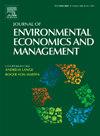价值的价值:通过非市场估值改善决策的好处
IF 5.9
3区 经济学
Q1 BUSINESS
Journal of Environmental Economics and Management
Pub Date : 2025-02-26
DOI:10.1016/j.jeem.2025.103148
引用次数: 0
摘要
关于非市场价值的信息有可能改善决策,但衡量这些价值的方法代价高昂,而且可能不准确。本研究开发了一个贝叶斯信息价值(VOI)模型来评估进行非市场估值(NMV)研究的收益何时以及是否超过成本,以及哪种方法被认为提供了最高的预期净收益。该方法使用水质改善决策来说明,VOI估计了声明偏好,显示偏好和利益转移方法,前两种方法在不同程度上实现了最佳实践。每种估价方法的预期准确性的信息是通过结构化的专家启发得出的。结果表明,NMV研究的净VOI差异很大,并取决于多种因素,包括项目规模、现有知识的质量、NMV方法的准确性、测量价值的类型(例如,使用价值与不使用价值)以及应用每种方法的成本。研究结果表明,关于NMV估计值的熟悉叙述可能过于简单,这表明有必要采用更细致入微的方法来研究应用。虽然只演示了一个案例研究,但该方法可以适用于许多决策设置。本文章由计算机程序翻译,如有差异,请以英文原文为准。
The value of a value: The benefits of improved decision making informed by non-market valuation
Information on non-market values has the potential to improve decision making but approaches to measure these values are costly and may be inaccurate. This study develops a Bayesian value of information (VOI) model to evaluate when and if the benefit of conducting a non-market valuation (NMV) study exceeds the cost, and which method of those considered delivers the highest expected net benefit. The approach is illustrated using a water quality improvement decision, with VOI estimated for stated preference, revealed preference and benefit transfer methods, the first two implemented at varying degrees of best practice. Information on the anticipated accuracy of each valuation method is derived via structured expert-elicitation. Results show that the net VOI from NMV studies varies widely and depends on multiple factors, including project scale, the quality of existing knowledge, the accuracy of NMV methods, the type of values measured (e.g., use versus nonuse values) and the costs of applying each method. Findings suggest that familiar narratives regarding the value of NMV estimates may be too simplistic, suggesting that a more nuanced approach to study application is warranted. Although demonstrated for one case study, the approach can be adapted to many decision settings.
求助全文
通过发布文献求助,成功后即可免费获取论文全文。
去求助
来源期刊
CiteScore
8.00
自引率
4.30%
发文量
91
期刊介绍:
The Journal of Environmental Economics and Management publishes theoretical and empirical papers devoted to specific natural resources and environmental issues. For consideration, papers should (1) contain a substantial element embodying the linkage between economic systems and environmental and natural resources systems or (2) be of substantial importance in understanding the management and/or social control of the economy in its relations with the natural environment. Although the general orientation of the journal is toward economics, interdisciplinary papers by researchers in other fields of interest to resource and environmental economists will be welcomed.

 求助内容:
求助内容: 应助结果提醒方式:
应助结果提醒方式:


